句型
英语八大常用句型
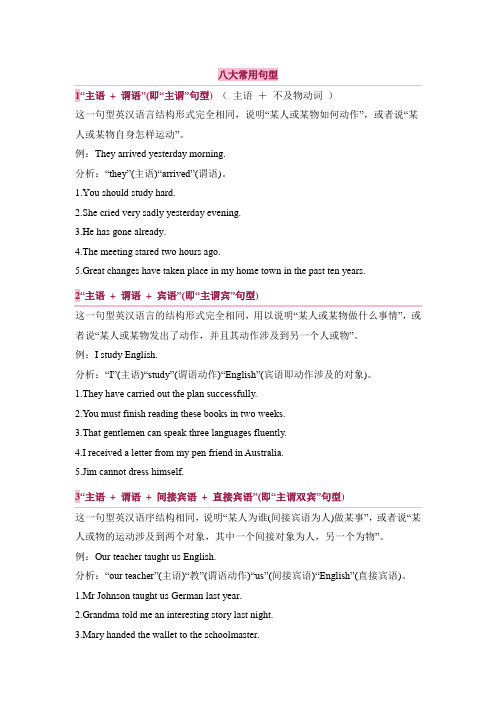
八大常用句型1“主语+ 谓语”(即“主谓”句型) (主语+不及物动词)这一句型英汉语言结构形式完全相同,说明“某人或某物如何动作”,或者说“某人或某物自身怎样运动”。
例:They arrived yesterday morning.分析:“they”(主语)“arrived”(谓语)。
1.You should study hard.2.She cried very sadly yesterday evening.3.He has gone already.4.The meeting stared two hours ago.5.Great changes have taken place in my home town in the past ten years.2“主语+ 谓语+ 宾语”(即“主谓宾”句型)这一句型英汉语言的结构形式完全相同,用以说明“某人或某物做什么事情”,或者说“某人或某物发出了动作,并且其动作涉及到另一个人或物”。
例:I study English.分析:“I”(主语)“study”(谓语动作)“English”(宾语即动作涉及的对象)。
1.They have carried out the plan successfully.2.You must finish reading these books in two weeks.3.That gentlemen can speak three languages fluently.4.I received a letter from my pen friend in Australia.5.Jim cannot dress himself.3“主语+ 谓语+ 间接宾语+ 直接宾语”(即“主谓双宾”句型)这一句型英汉语序结构相同,说明“某人为谁(间接宾语为人)做某事”,或者说“某人或物的运动涉及到两个对象,其中一个间接对象为人,另一个为物”。
英语的八大句型结构
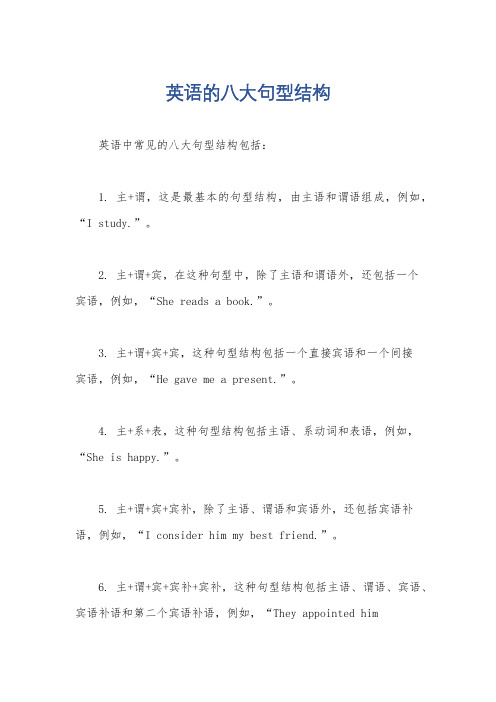
英语的八大句型结构
英语中常见的八大句型结构包括:
1. 主+谓,这是最基本的句型结构,由主语和谓语组成,例如,“I study.”。
2. 主+谓+宾,在这种句型中,除了主语和谓语外,还包括一个
宾语,例如,“She reads a book.”。
3. 主+谓+宾+宾,这种句型结构包括一个直接宾语和一个间接
宾语,例如,“He gave me a present.”。
4. 主+系+表,这种句型结构包括主语、系动词和表语,例如,“She is happy.”。
5. 主+谓+宾+宾补,除了主语、谓语和宾语外,还包括宾语补语,例如,“I consider him my best friend.”。
6. 主+谓+宾+宾补+宾补,这种句型结构包括主语、谓语、宾语、宾语补语和第二个宾语补语,例如,“They appointed him
chairman.”。
7. There be 句型,这种句型结构以“There”开头,后面跟着be动词和主语,例如,“There is a cat on the table.”。
8. 主+谓+宾+宾补+定语,这种句型结构包括主语、谓语、宾语、宾语补语和定语,例如,“I find the movie very interesting.”。
这些句型结构覆盖了英语中常见的句子形式,掌握这些句型能
够帮助学习者更好地理解和运用英语语法。
希望这些信息能对你有
所帮助。
简单句的基本句型有哪些

简单句的基本句型有哪些1.“主语 + 谓语”(即“主谓”句型);2.“主语 + 谓语 + 宾语”(即“主谓宾”句型);3.“主语 + 谓语 + 间接宾语 + 直接宾语”(即“主谓双宾”句型);4.“主语 + 谓语 + 宾语 + 宾语补足语”(即“主谓宾宾补”句型);5.“主语 + 系动词+ 表语”(即“主系表”句型)。
扩展资料1.“主语 + 谓语”(即“主谓”句型)这一句型英汉语言结构形式完全相同,说明“某人或某物如何动作”,或者说“某人或某物自身怎样运动”。
例:They arrived in Harbin yesterday morning.分析:“they”(主语)“arrived”(谓语)。
2.“主语 + 谓语 + 宾语”(即“主谓宾”句型)这一句型英汉语言的结构形式完全相同,用以说明“某人或某物做什么事情”,或者说“某人或某物发出了动作,并且其动作涉及到另一个人或物”。
例:I study English.分析:“I”(主语)“study”(谓语动作)“English”(宾语即动作涉及的对象)。
3.“主语 + 谓语 + 间接宾语 + 直接宾语”(即“主谓双宾”句型)这一句型英汉语序结构相同,说明“某人为谁(间接宾语为人)做某事”,或者说“某人或物的运动涉及到两个对象,其中一个间接对象为人,另一个为物”。
例:Our teacher taught us English.分析:“our teacher”(主语)“教”(谓语动作)“us”(间接宾语)“English”(直接宾语)。
4.“主语 + 谓语 + 宾语 + 宾语补足语”(即“主谓宾宾补”句型)这一句型说明“某人或某物要求(使、让)某人做什么”或“某人感觉某人或物怎么样”。
例: He asked her to go there.分析:“he”(主语)“asked”(谓语动作)“her”(宾语即动作涉及的对象)“to go there”(补语—补充说明宾语做什么)。
英语中五大基本句型是什么
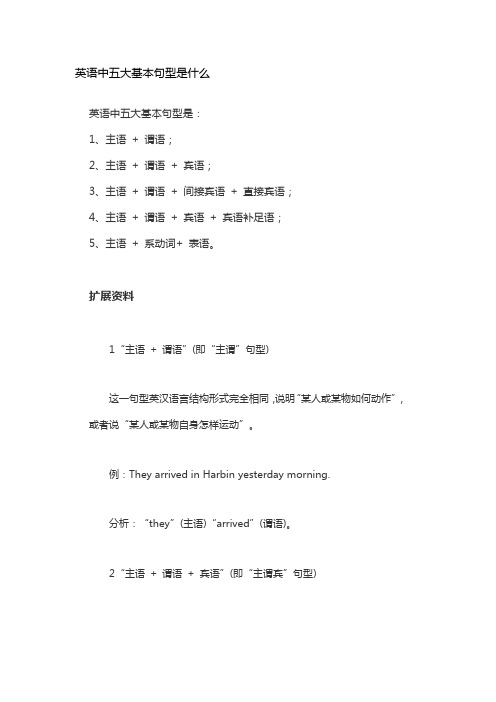
英语中五大基本句型是什么英语中五大基本句型是:1、主语+ 谓语;2、主语+ 谓语+ 宾语;3、主语+ 谓语+ 间接宾语+ 直接宾语;4、主语+ 谓语+ 宾语+ 宾语补足语;5、主语+ 系动词+ 表语。
扩展资料1“主语+ 谓语”(即“主谓”句型)这一句型英汉语言结构形式完全相同,说明“某人或某物如何动作”,或者说“某人或某物自身怎样运动”。
例:They arrived in Harbin yesterday morning.分析:“they”(主语)“arrived”(谓语)。
2“主语+ 谓语+ 宾语”(即“主谓宾”句型)这一句型英汉语言的结构形式完全相同,用以说明“某人或某物做什么事情”,或者说“某人或某物发出了动作,并且其动作涉及到另一个人或物”。
例:I study English.分析:“I”(主语)“study”(谓语动作)“English”(宾语即动作涉及的'对象)。
3“主语+ 谓语+ 间接宾语+ 直接宾语”(即“主谓双宾”句型)这一句型英汉语序结构相同,说明“某人为谁(间接宾语为人)做某事”,或者说“某人或物的运动涉及到两个对象,其中一个间接对象为人,另一个为物”。
例:Our teacher taught us English.分析:“our teacher”(主语)“教”(谓语动作)“us”(间接宾语)“English”(直接宾语)。
4“主语+ 谓语+ 宾语+ 宾语补足语”(即“主谓宾补”句型)这一句型说明“某人或某物要求(使、让)某人做什么”或“某人感觉某人或物怎么样”。
例:He asked her to go there.分析:“he”(主语)“asked”(谓语动作)“her”(宾语即动作涉及的对象)“to go there”(补语—补充说明宾语做什么)。
5“主语+ 系动词+ 表语”(即“主系表”句型)这一句型用以说明“某人(某物、某事、某种概念)具有什么特征或处于什么状态”。
100个英语模板句型

100个英语模板句型1. want to do sth 想做某事2. want …… to do sth 想让某人做某事3. be different from 与……不同4. be the same as 与……相同5. be friendly to ……对某人友好6. welcome to ……欢迎来到某地7. What’s the matter with ……/sth?某人/某物出什么毛病了?8. what to do 做什么9. let …… do sth 让某人做某事10. let …… not do sth 让某人不做某事11. why don’t you do sth?你怎么不做某事呢?12. why not do sth?怎么不做某事呢?13. make …… sth 为某人制造某物14. make sth for ……为某人制造某物15. What do you mean by doing sth?你做……是什么意思?16. like doing sth 喜爱做某事17. like to do sth 想去做某事18. feel like doing sth 想要做某事19. would like to do sth 想要做某事20. would like …… to do sth 想要某人做某事21. make …… do sth 使某人做某事22. let …… do sth 让某人做某事23. have …… do sth 使某人做某事24. be far from ……离某地远25. be near to ……离某地近26. be good at sth/doing sth 擅长某事/做某事27. It takes …… some time to do sth 做某事花费某人多长时间28. ……ends some time/money (in )doing sth 某人花一些时间/钱做某事29. …………ends some time/money on sth 某人花一些时间/钱在某事/物上30. sth costs …… some money 某物花了某人一些钱31. …… pays some money for sth 某人为某物付了一些钱32. begin/start sth with sth 伴随……开始做某事33. be going to do sth 打算做某事34. call A B 叫A B35. thank …… for sth/doing sth 感谢某人做某事36. What……for?为什么?37. How/ what about doing sth?做某事怎么样?38. S +be+ the+最高级+of/in短语39. S + be +比较级+than any other + n40. have to do sth 不得不/必须做某事41. had better do sth 最好做某事42. had better not do sth 最好别做某事43. help …… to do sth 帮助某人做某事44. help …… do st 帮助某人做某事45. help …… with sth 帮助某人做某事46. make it +时间把时间定在……47. take …… to ……带某人到某地49. have nothing to do (with ……)与某人没有关系50. 主语+ don’t think + 从句……认为……不……51. It’s + adj + for …… to do sth 做某事对某人来说怎么样52. How + adj/adv + 主+ 谓!……多么…...啊!53. what + a/an + adj + [c] + 主+ 谓!54. What + adj+ pl/[u] +主+ 谓!55. find it + adj + to do sth 发现做某事如何56. ask …… for sth 向某人要某物57. need to do sth 需要做某事58. need sth 需要某物59. use sth to do sth 用某物来做某事60. show …… sth 给某人看某物61. show sth to ……把某物给某人看62. pass …… sth 把某物递给某人63. pass sth to ……把某物递给某人64. buy …… sth 为某人买某物65. buy sth for ……为某人买某物66. give …… sth 把某物给某人67. give sth to ……把某物给某人68. get to ……达到某地69. arrive at/in ……达到某地70. reach ……达到某地71. hope to do sth 希望某人做某事72. there is sth wrong with sth/……某物/某人出毛病了73. sth is wrong with……某物出毛病了74. How do you like sth?你认为……怎么样?75.What do you think of sth?你认为……怎么样?76. start doing sth 开始做某事77. start to do sth 开始做某事78. finish doing sth 完成做某事79. enjoy doing sth 喜欢做某事80. what else……别的什么81. forget doing sth 忘记做过某事(已做)82. forget to do sth 忘了做某事(未做)83. remember doing sth 记得做过某事(已做)84. remember to do sth 记住做某事(未做)85. stop to do sth 停下来去做另一件事86. stop doing sth 停止正在做的事87. watch/see/hear …… do sth 观看/看见/听见某人做了某事88. watch/see/hear …… doing sth 观看/看见/听见某人在做某事89. go on doing sth 继续做同一件事90. go on to do sth 继续做另一件事91. go on with sth 继续某事He went on with his work after a short rest.在短暂的休息后,他继续他的工作。
英语的句型句式大全

英语的句型句式大全一、基础句型1.Subject + Verb–Examples:•She runs.•They eat.2.Subject + Verb + Object–Examples:•I love you.•He reads books.3.Subject + Verb + Indirect Object + Direct Object–Examples:•She gave me a gift.•He bought her a car.4.Subject + Verb + Complement–Examples:•She is happy.•They are friends.二、特殊句型1.Question Form–Examples:•Where is the cat?•Did you see the movie?2.Conditional Sentences–Examples:•If it rains, we will stay inside.•She would come if she had time.3.Passive Voice–Examples:•The book was written by the author.•The cake was eaten by the children.三、复杂句式1.Relative Clauses–Examples:•The boy who is wearing a red shirt is my brother.•The book that I borrowed from the library is interesting.2.Coordinating Conjunctions–Examples:•I want both the cake and the ice cream.•He is not only smart but also kind.3.Subordinating Conjunctions–Examples:•Although it was raining, we went out.•She will come when she finishes work.四、强调句型1.It is/was + Adjective + that/who + Subject + Verb–Example:•It was Mary who won the competition.2.Subject + Verb + what/who/which + Object + Verb–Example:•I saw what you did.五、形容词和副词的句型1.Adjective + Noun–Examples:•Beautiful flowers•Fast car2.Adverb + Verb–Examples:•Quickly run•Carefully readparative and Superlative Forms–Examples:•He is taller than his brother.•She is the smartest in the class.六、感叹句型1.What + Noun + Subject + Verb!–Example:•What a beautiful day it is!2.How + Adjective/Adverb + Subject + Verb!–Example:•How quickly he runs!以上是英语中常见的句型句式,掌握这些基础句型和特殊句型可以帮助提升英语表达能力,丰富句子结构,让语言更加生动自然。
五种基本句型

五种基本句型高一英语五种基本句型1、主语+ 系动词+ 表语2、主语+ 不及物动词3、主语+ 及物动词+ 宾语4、主语+ 及物动词+ 间接宾语+ 直接宾语5、主语+ 及物动词+ 宾语+ 宾语补足语主语+ 系动词+ 表语1. Jack is a good boy.2. The park looks beautiful in spring.3. His leg got hurt just now.4. Please keep silent!5. Tom will become a doctor next year.主语+ 不及物动词1. My grandma is sleeping now.2. I will stay in Shanghai for a week.3. Jack is leaving for New York.4. It rained hard last night.5. Lucy arrived in Beijing yesterday.主语+ 及物动词+ 宾语1. My sister is writing a letter at this moment.2. Jack enjoys collecting stamps.3. Our teacher promised to see themovie with us.4. I d on’t know which school he is in.主语+ 及物动词+间接宾语+ 直接宾语1. His father bought him a computer.2. I sent a birthday gift to her yesterday.3. My mother taught me how to do it.4. She asked Lucy whose pen it was. 主语+ 及物动词+宾语+ 宾语补足语1. We must keep the classroom clean.2. They consider Jack a brave boy.3. Let the fresh air in.4. Lucy will make herself known.5. I saw the little girl dancing.简单句的五种基本句型歌诀:英语句型万万千,五大句型把线牵;句型种类为动词,后接什么是关键;系词后面接表语,Vi.独身无牵连;Vt.又可分三类,单宾双宾最常见,还有宾语补足语,各类搭配记心间。
七大基本句型结构
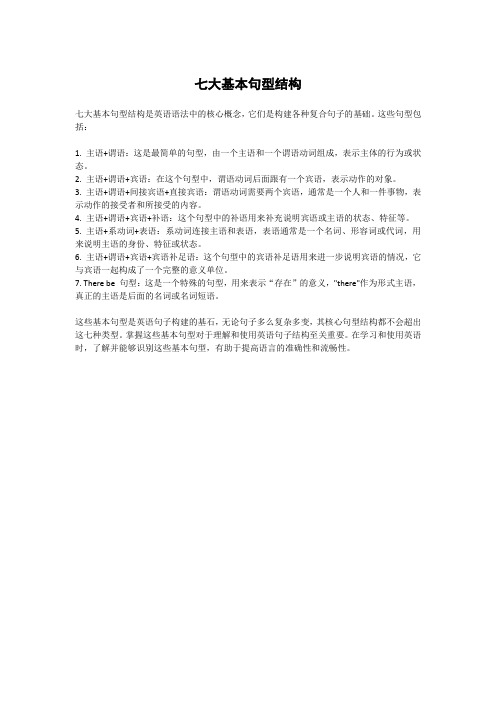
七大基本句型结构
七大基本句型结构是英语语法中的核心概念,它们是构建各种复合句子的基础。
这些句型包括:
1. 主语+谓语:这是最简单的句型,由一个主语和一个谓语动词组成,表示主体的行为或状态。
2. 主语+谓语+宾语:在这个句型中,谓语动词后面跟有一个宾语,表示动作的对象。
3. 主语+谓语+间接宾语+直接宾语:谓语动词需要两个宾语,通常是一个人和一件事物,表示动作的接受者和所接受的内容。
4. 主语+谓语+宾语+补语:这个句型中的补语用来补充说明宾语或主语的状态、特征等。
5. 主语+系动词+表语:系动词连接主语和表语,表语通常是一个名词、形容词或代词,用来说明主语的身份、特征或状态。
6. 主语+谓语+宾语+宾语补足语:这个句型中的宾语补足语用来进一步说明宾语的情况,它与宾语一起构成了一个完整的意义单位。
7. There be 句型:这是一个特殊的句型,用来表示“存在”的意义,"there"作为形式主语,真正的主语是后面的名词或名词短语。
这些基本句型是英语句子构建的基石,无论句子多么复杂多变,其核心句型结构都不会超出这七种类型。
掌握这些基本句型对于理解和使用英语句子结构至关重要。
在学习和使用英语时,了解并能够识别这些基本句型,有助于提高语言的准确性和流畅性。
40个高级英语句型-必备!
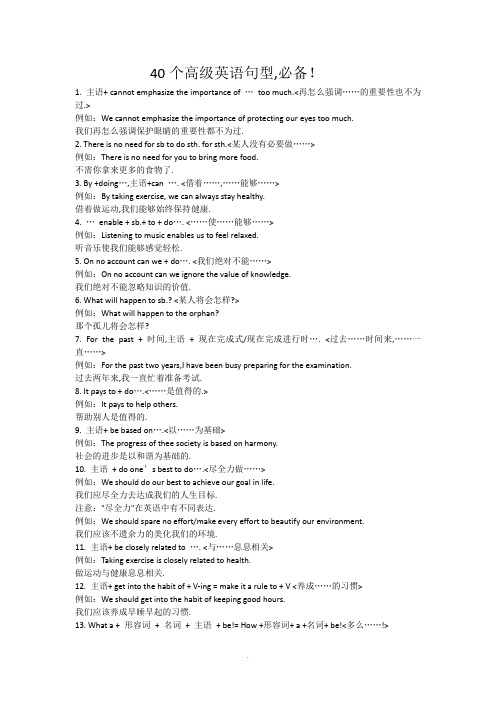
40个高级英语句型,必备!1. 主语+ cannot emphasize the importance of …too much.<再怎么强调……的重要性也不为过.>例如:We cannot emphasize the importance of protecting our eyes too much.我们再怎么强调保护眼睛的重要性都不为过.2. There is no need for sb to do sth. for sth.<某人没有必要做……>例如:There is no need for you to bring more food.不需你拿来更多的食物了.3. By +doing…,主语+can …. <借着……,……能够……>例如:By taking exercise, we can always stay healthy.借着做运动,我们能够始终保持健康.4. …enable + sb.+ to + do…. <……使……能够……>例如:Listening to music enables us to feel relaxed.听音乐使我们能够感觉轻松.5. On no account can we + do…. <我们绝对不能……>例如:On no account can we ignore the value of knowledge.我们绝对不能忽略知识的价值.6. What will happen to sb.? <某人将会怎样?>例如:What will happen to the orphan?那个孤儿将会怎样?7. For the past + 时间,主语+ 现在完成式/现在完成进行时…. <过去……时间来,……一直……>例如:For the past two years,I have been busy preparing for the examination.过去两年来,我一直忙着准备考试.8. It pays to + do….<……是值得的.>例如:It pays to help others.帮助别人是值得的.9. 主语+ be based on….<以……为基础>例如:The progress of thee society is based on harmony.社会的进步是以和谐为基础的.10. 主语+ do one’s best to do….<尽全力做……>例如:We should do our best to achieve our goal in life.我们应尽全力去达成我们的人生目标.注意:"尽全力"在英语中有不同表达.例如:We should spare no effort/make every effort to beautify our environment.我们应该不遗余力的美化我们的环境.11. 主语+ be closely related to …. <与……息息相关>例如:Taking exercise is closely related to health.做运动与健康息息相关.12. 主语+ get into the habit of + V-ing = make it a rule to + V <养成……的习惯>例如:We should get into the habit of keeping good hours.我们应该养成早睡早起的习惯.13. What a + 形容词+ 名词+ 主语+ be!= How +形容词+ a +名词+ be!<多么……!>例如:What an important thing it is to keep our promise!= How important a thing it is to keep our promise!遵守诺言是多么重要的事!14. 主语+ do good/ harm to sth.. <对……有益/有害>例如:Reading does good to our mind.读书对心灵有益.Overwork does harm to health.工作过度对健康有害.15. 主语+ have a great influence on sth. <对……有很大的影响>例如:Smoking has a great influence on our health.抽烟对我们的健康有很大的影响.16. nothing can prevent us from doing…. <没有事情能够阻挡我们做……>例如:All this shows that nothing can prevent us from reaching our aims.这显示了没有事情能够阻挡我们实现目标.17. Upon/On doing…, …. <一……就…….>例如:Upon / On hearing of the unexpected news, he was so surprised that he couldn’t say a word.一听到这个出乎意料的消息,他惊讶到说不出话来.注意:此句型一般可以改为如下复合句句型.例如:As soon as he heard of the unexpected news, he was so surprised that he ….他一听到这个出乎意料的消息,就如此惊讶以至于......Hardly had he arrived when she started plaining.他刚来,她就开始抱怨.No sooner had he arrived than it began to rain.他刚来,就下雨了.18. would rather do…than do…<宁愿……而不……>例如:I would rather walk home than take a crowded bus.我宁愿步行回家也不愿做拥挤的公交车.注意:此句型可以改为prefer to do…rather than do…句型.例如:I prefer to stay at home rather than see the awful film with him.我宁愿呆在家也不愿意和他去看那部恐怖电影.19. only + 状语, 主句部分倒装例如:Only then could the work of reconstruction begin.直到那时,重建工作才开始.20. be worth doing <值得做>例如:The book is worth reading.这本书值得读.21. Owing to/Thanks to sth, …. <因为……>例如:Thanks to his encouragement, I finally realized my dream.因为他的鼓励,我终于实现我的梦想.22. 主语+ is + the +形容词最高级+名词+<that>+主语+ have ever + seen<known / heard / had / read,etc>例如:Liu Yifei is the most beautiful girl that I have ever seen in my life.刘亦菲是我所看过最美丽的女孩.注意,比较级也可以用来表达最高级的意思.例如:I have never seen a more beautiful girl than Liu Yifei in my life.在我生活中我从来没见过比刘亦菲更美的女孩.Nothing is more important than to receive education.没有比接受教育更重要的事.23. There is no denying that + S + V….<不可否认的……>例如:There is no denying that the qualities of our living have gone from bad to worse.不可否认的,我们的生活品质已经每况愈下.24. It is universally acknowledged that +从句<全世界都知道……>例如:It is universally acknowledged that trees are indispensable to us.全世界都知道树木对我们是不可或缺的.注意,全世界都知道还可以改为以下句型:As is known to us/As we all know, …. <众所周知,……>.例如:As is known to us/As we all know, knowledge is power.众所周知,知识就是力量.25. There is no doubt that +从句<毫无疑问的……>例如:There is no doubt that he came late.毫无疑问,他来晚了.26. <It is> No wonder that.... <难怪……>例如:No wonder that he fell asleep in class.难怪他在课堂上睡着了.27. So + 形容词+ be + 主词+ that + 从句<如此……以致于……>例如:So precious is time that we can’t afford to waste it.时间是如此珍贵,我们经不起浪费它.28. 形容词+ as +主语+ be,主语+ 谓语<虽然……>例如:Rich as our country is, the qualities of our living are by no means satisfactory.虽然我们的国家富有,我们的生活品质绝对令人不满意.29. The + 比较级+主语+谓语, the +比较级+主语+谓语<愈……愈……>例如:The harder you work, the more progress you make.你愈努力,你愈进步.30. It is time + 主语+ 过去式<该是……的时候了>例如:It is time the authorities concerned took proper steps to solve the traffic problems.该是有关当局采取适当的措施来解决交通问题的时候了.注意:此句型可以转化为简单句句型:It is time for sth./for sb to do….例如:It is time for lunch.该吃午饭了.31. To be frank/ To tell the truth, …. <老实说, ……>例如: To be frank/ To tell the truth, whether you like it or not, you have no other choice.老实说,不论你喜不喜欢,你别无选择.32. it took him a year to do….< 他用了1年的时间来做……>例如:As far as we know, it took him more than a year to write the book.到目前为止我们所知道的是,他用了1年的时间来写这本书.It took them a long time to realize they had made a mistake.过了很久,他们才意识到犯错了.33. spent as much time as he could doing sth.<花尽可能的时间做某事>例如:He spent as much time as he could remembering new words.他花了尽可能多时间记新单词.34. Since + 主语+ 过去式,主语+ 现在完成式例如:Since he went to senior high school, he has worked very hard.自从他上高中,他一直很用功.35. An advantage of…is that + 句子<……的优点是……>例如:An advantage of using the solar energy is that it won’t create <produce> any pollution. 使用太阳能的优点是它不会制造任何污染.36. It was not until recently that….< 直到最近, ……>例如:It was not until recently that the problem was solved. 直到最近这个问题才被解决. 37. We will be successful as long as we…. <只要我们……,我们就会成功的>例如:We will be successful as long as we insist on working hard.只要我们坚持努力工作,我们会成功的.38. No matter + wh-从句,….例如:No matter how difficult English may be, you should do your best to learn it.不管英语有多么难,你都应该尽你最大的努力来学它.注意:此句型一般可以改为疑问词+ever引导的从句,+主句例如:Whatever he asks you to do, please refuse him.无论他让你做什么,都请拒绝他.39. It’s useless/ no good / no use doing sth. <做……是没有用的>例如:It’s no use crying over spilt milk.覆水难收.40. The reason why + 从句is that + 从句<……的原因是……>例如:The reason why we have to grow trees is that they can supply fresh air for us.我们必须种树的原因是它们能供应我们新鲜的空气.。
英语所有句型
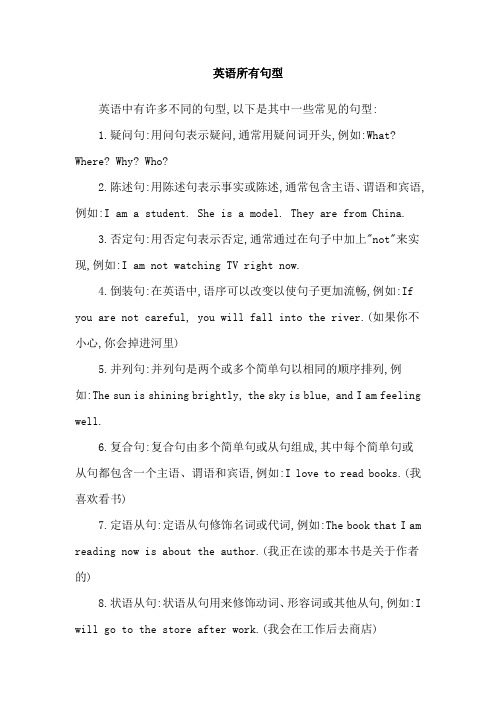
英语所有句型英语中有许多不同的句型,以下是其中一些常见的句型:1.疑问句:用问句表示疑问,通常用疑问词开头,例如:What? Where? Why? Who?2.陈述句:用陈述句表示事实或陈述,通常包含主语、谓语和宾语,例如:I am a student. She is a model. They are from China.3.否定句:用否定句表示否定,通常通过在句子中加上"not"来实现,例如:I am not watching TV right now.4.倒装句:在英语中,语序可以改变以使句子更加流畅,例如:If you are not careful, you will fall into the river.(如果你不小心,你会掉进河里)5.并列句:并列句是两个或多个简单句以相同的顺序排列,例如:The sun is shining brightly, the sky is blue, and I am feeling well.6.复合句:复合句由多个简单句或从句组成,其中每个简单句或从句都包含一个主语、谓语和宾语,例如:I love to read books.(我喜欢看书)7.定语从句:定语从句修饰名词或代词,例如:The book that I am reading now is about the author.(我正在读的那本书是关于作者的)8.状语从句:状语从句用来修饰动词、形容词或其他从句,例如:I will go to the store after work.(我会在工作后去商店)9.省略句:省略句省略了非谓语动词或某些从句,例如:I have been to Paris.(我去过巴黎)以上是一些常见的英语句型,但并不是所有句型都适用,具体的句型取决于上下文和语境。
英语句型大全
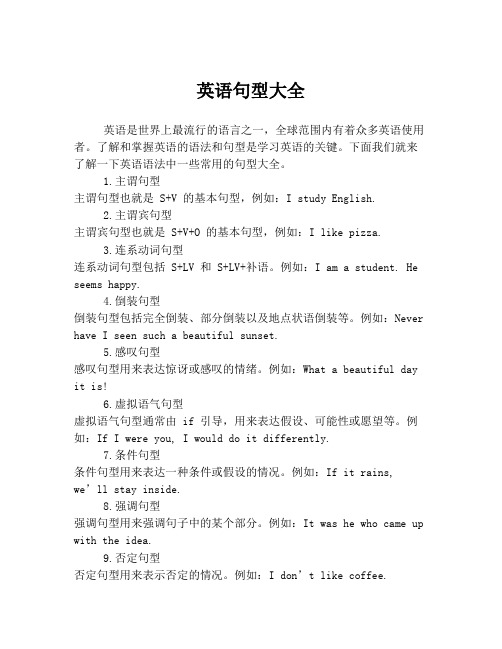
英语句型大全英语是世界上最流行的语言之一,全球范围内有着众多英语使用者。
了解和掌握英语的语法和句型是学习英语的关键。
下面我们就来了解一下英语语法中一些常用的句型大全。
1.主谓句型主谓句型也就是 S+V 的基本句型,例如:I study English.2.主谓宾句型主谓宾句型也就是 S+V+O 的基本句型,例如:I like pizza.3.连系动词句型连系动词句型包括 S+LV 和 S+LV+补语。
例如:I am a student. He seems happy.4.倒装句型倒装句型包括完全倒装、部分倒装以及地点状语倒装等。
例如:Never have I seen such a beautiful sunset.5.感叹句型感叹句型用来表达惊讶或感叹的情绪。
例如:What a beautiful day it is!6.虚拟语气句型虚拟语气句型通常由 if 引导,用来表达假设、可能性或愿望等。
例如:If I were you, I would do it differently.7.条件句型条件句型用来表达一种条件或假设的情况。
例如:If it rains, we’ll stay inside.8.强调句型强调句型用来强调句子中的某个部分。
例如:It was he who came up with the idea.9.否定句型否定句型用来表示否定的情况。
例如:I don’t like coffee.10.疑问句型疑问句型用来提出疑问或问题。
例如:Where is the nearest subway station?以上就是英语语法中常用的句型大全。
在学习英语的过程中,了解这些常用的句型,可以帮助我们更好地理解和运用英语。
同时也需要多多练习,熟悉各种句型的用法和语感。
祝愿大家在英语学习的过程中取得好的成绩!。
八种基本句型例句

八种基本句型例句1、主语+谓语。
2、主语+谓语+宾语。
3、主语+谓语+间接宾语+直接宾语。
4、主语+谓语+宾语+宾语补足语。
5、主语+系动词+表语。
6、There+be+主语+。
7、比较句型。
8、it+is/was+形容词+to do/that从句。
“主语+谓语”(即“主谓”句型):这一句型英汉语言结构形式完全相同,说明“某人或某物如何动作”,或者说“某人或某物自身怎样运动”。
例:The yar rive din Harbin yesterday morning.“主语+谓语+宾语”(即"主谓宾”句型):这一句型英汉语言的'结构形式完全相同,用以说明“某人或某物做什么事情”,或者说“某人或某物发出了动作,并且其动作涉及到另一个人或物”。
例:I study English."主语+谓语+间接宾语+直接宾语”(即“主谓双宾”句型):这一句型英汉语序结构相同,说明“某人为谁(间接宾语为人)做某事”,或者说“某人或物的运动涉及到两个对象,其中一个间接对象为人,另一个为物”。
例:Our teacher taught us English.“主语+谓语+宾语+宾语补足语”(即“主谓宾补”句型):这一句型说明“某人或某物要求(使、让)某人做什么”或“某人感觉某人或物怎么样”。
例:He asked her to go there."主语+系动词+表语”(即“主系表”句型):这一句型用以说明“某人(某物、某事、某种概念)具有什么特征或处于什么状态”。
汉语的“是”字结构属于这一英语句型的形式之一。
常用的联系动词有be,keep,lie,remain,stand,become,fal,get,go,grow,turn,look,feel,seem,smell,sound,taste,例:I a mate a cher..我是一名老师。
“There+be+主语+.”(即“存在”句型):这一句型用以说明“在某地或某时存在某人或某物”。
英语八大句型结构

英语八大句型结构英语八大句型结构如下:1. 主语+谓语(不及物动词):这种句型中的动词是不及物的,不需要宾语,句子的主语通常是名词或代词。
例如:The sun rises in the east. 太阳在东方升起。
2. 主语+谓语(及物动词)+宾语:这种句型中的动词是及物的,需要一个宾语来表达完整的意思。
宾语通常是名词或代词。
例如:They love music. 他们热爱音乐。
3. 主语+系动词+表语:这种句型中的动词是系动词,用来连接主语和表语,表达主语的状态或属性。
表语通常是形容词或名词。
例如:He is a doctor. 他是一名医生。
4. 主语+谓语(及物动词)+间接宾语+直接宾语:这种句型中的动词有两个宾语,一个是指人或动物的间接宾语,另一个是指物品或事件的直接宾语。
间接宾语通常放在直接宾语之前。
例如:She gave me a smile. 她给了我一个微笑。
5. 主语+谓语(及物动词)+宾语+宾补:这种句型中的动词需要一个宾语和一个补足语来表达完整的意思。
补足语通常是形容词或名词,用来补充说明宾语的情况或性质。
例如:They elected him president. 他们选举他为总统。
6. 主语+谓语(情态动词)+动词原形:这种句型中的动词是情态动词,表示可能性、必要性、意愿等情感色彩,后面跟一个动词原形,表达动作或状态。
例如:I should go to the doctor. 我应该去看医生。
7. 主语+谓语(be 动词)+表语(形容词或名词):这种句型中的动词是be 动词,用来表达主语的身份或特征,后面跟一个形容词或名词作为表语。
例如:He is a intelligent boy. 他是一个聪明的男孩。
8. There be +主语+地点状语/时间状语:这种句型用来表达存在或发生某事的地方或时间,通常用there be 表示“有”、“存在”的意思,后面跟一个名词或代词作为主语,再加上地点或时间状语。
英语句式语法
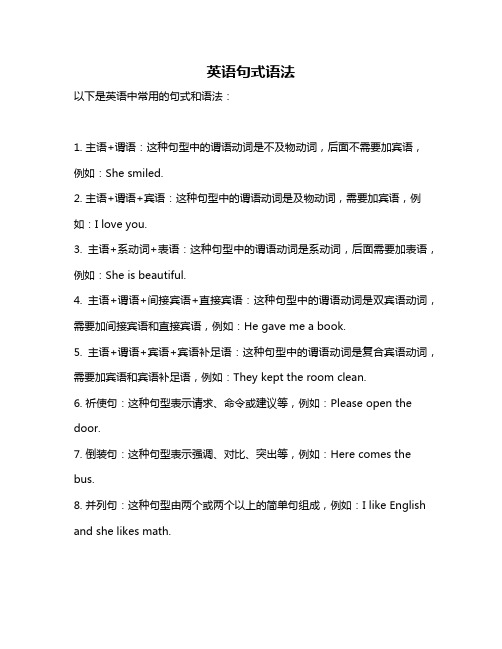
英语句式语法
以下是英语中常用的句式和语法:
1. 主语+谓语:这种句型中的谓语动词是不及物动词,后面不需要加宾语,例如:She smiled.
2. 主语+谓语+宾语:这种句型中的谓语动词是及物动词,需要加宾语,例如:I love you.
3. 主语+系动词+表语:这种句型中的谓语动词是系动词,后面需要加表语,例如:She is beautiful.
4. 主语+谓语+间接宾语+直接宾语:这种句型中的谓语动词是双宾语动词,需要加间接宾语和直接宾语,例如:He gave me a book.
5. 主语+谓语+宾语+宾语补足语:这种句型中的谓语动词是复合宾语动词,需要加宾语和宾语补足语,例如:They kept the room clean.
6. 祈使句:这种句型表示请求、命令或建议等,例如:Please open the door.
7. 倒装句:这种句型表示强调、对比、突出等,例如:Here comes the bus.
8. 并列句:这种句型由两个或两个以上的简单句组成,例如:I like English and she likes math.
9. 省略句:这种句型省略了某些不必要的部分,例如:Let’s go (to the park).
10. 强调句:这种句型强调某个成分,例如:It was she who helped me. 以上是英语中常用的句式和语法,希望能对您有所帮助。
汉语语法八种基本句型

汉语语法八种基本句型汉语是一种非常古老而又复杂的语言,其语法规则也十分繁琐。
在学习汉语的过程中,最基本的句型有八种,分别是:1. 主谓句型主谓句型是最基本的句型之一,由主语和谓语构成。
主语一般在句子的开头,而谓语则是主语所述的动作或状态。
例如:“小明吃饭。
”、“大树在风中摇曳。
”。
2. 主谓宾句型主谓宾句型比主谓句型多了一个宾语,一般放在动词后面。
宾语可以是名词、代词、数字、量词等。
例如:“他买了一本书。
”、“我喜欢吃水果。
”3. 主谓宾定句型主谓宾定句型是在主谓宾句型基础上再添加一个定语。
定语一般修饰宾语,放在宾语前面。
例如:“我看见了那个穿红衣服的女孩。
”。
4. 主谓双宾句型主谓双宾句型比主谓宾句型多了一个间接宾语。
间接宾语一般放在直接宾语前面,表示接受动作的人或者物品。
例如:“他送我一本书。
”。
5. 系表结构句型系表结构句型由系动词和表语组成。
系动词一般是“是”,表语可以是形容词、名词、代词等。
例如:“天气很好。
”、“他是个老师。
”6. 否定句型否定句型可以用来表达否定的含义。
一般在谓语动词前面加上“不”。
例如:“我不喜欢喝咖啡。
”、“他不是个好人。
”7. 疑问句型疑问句型用来提问,一般在句子开头或者结尾使用疑问词,例如:“你是谁?”、“这是什么?”8. 祈使句型祈使句型用来表示请求、命令或劝告等意义,一般省略主语,使用动词原形加上“吧”、“呢”等助词。
例如:“别说了!”、“多喝水吧!”以上就是汉语的八种基本句型。
在学习汉语的过程中,了解这些基本句型,可以更好地理解和运用汉语,提高汉语的表达能力。
英语十四个句型
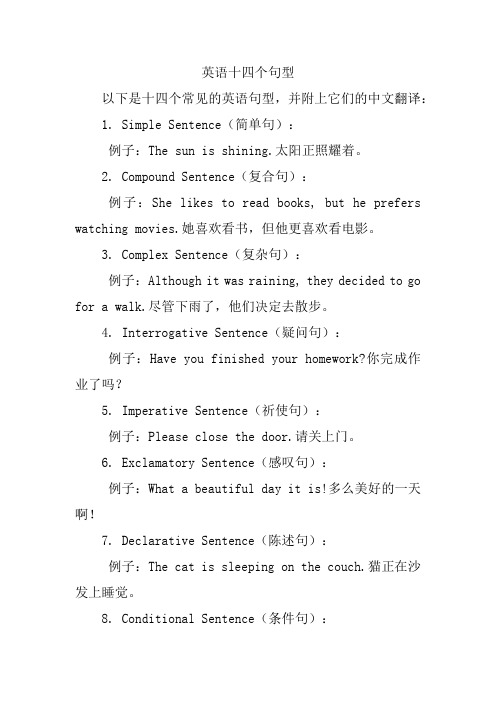
英语十四个句型以下是十四个常见的英语句型,并附上它们的中文翻译:1. Simple Sentence(简单句):例子:The sun is shining.太阳正照耀着。
2. Compound Sentence(复合句):例子:She likes to read books, but he prefers watching movies.她喜欢看书,但他更喜欢看电影。
3. Complex Sentence(复杂句):例子:Although it was raining, they decided to go for a walk.尽管下雨了,他们决定去散步。
4. Interrogative Sentence(疑问句):例子:Have you finished your homework?你完成作业了吗?5. Imperative Sentence(祈使句):例子:Please close the door.请关上门。
6. Exclamatory Sentence(感叹句):例子:What a beautiful day it is!多么美好的一天啊!7. Declarative Sentence(陈述句):例子:The cat is sleeping on the couch.猫正在沙发上睡觉。
8. Conditional Sentence(条件句):例子:If it rains, we will stay indoors.如果下雨,我们会呆在室内。
9. Passive Voice Sentence(被动语态句):例子:The cake was baked by Mary.蛋糕是玛丽烤的。
10. Direct Speech Sentence(直接引语句):例子:She said, "I will be there at 5 o'clock."她说:“我会在5点钟到那里。
- 1、下载文档前请自行甄别文档内容的完整性,平台不提供额外的编辑、内容补充、找答案等附加服务。
- 2、"仅部分预览"的文档,不可在线预览部分如存在完整性等问题,可反馈申请退款(可完整预览的文档不适用该条件!)。
- 3、如文档侵犯您的权益,请联系客服反馈,我们会尽快为您处理(人工客服工作时间:9:00-18:30)。
英语常用句型初学英语的人常常感到在掌握一些英语单词和基本语法后,在英语说和写方面还是很难表达自己,笔者认为其中一个原因是没有掌握一些英语句型,只有掌握了一些句型才能比较正确、完整地表达型。
1.否定句型1) 一般否定句I don't know this. No news is good news.2.There is no person (smoke)/not a person/not any person3.(smoke) in the house.2)特指否定He went to his office, not to see him.I am sorry for not coming on time.I don't think/believe/suppose/feel/imagine you are right.3)部分否定All the answers are not rightAll is not gold that glittersI don't know all of them.I can't see everybody/everything.Both of them are not right.全体否定None of my friends smoke.I can see nothing/nobody.Neither of them is right.Nothing can be so simple as this.5) 延续否定Y ou didn't see him, neither/nor did I.Y ou don't know, I don't know either.He doesn't know English, let alone/to say nothing of/not to speak of (更不用说)French. 6) 半否定句We seldom/hardly/scarcely/barely hear such fine singing.I know little English. I saw few people.7) 双重否定Y ou can't make something out of nothing.What's done cannot be undone.There is no sweet without sweat.No gain without pains.I can't help /keep/ laughing whenever I hear it.No man is so old but (that) he can learn.8)排除否定Everyone is ready except you.He did nothing but play.But for your help, I couldn't do it.9)加强否定I won't do it at all.I can't see it any more.He is no longer a boy2. 判断句型1) 一般判断句It is important for us to learn English.It is kind of you to help mesincere means honest.The boy is called/named T om.We regarded/consider it as an honor.2)强调判断It is English that we should learn.It is he who helped me a lot.3)弱式判断Y our sentence doesn't sound/look/appear/feel right.Y ou look/seem as if/as though you had been there before.Maybe/Perhaps/ she is ill.He is probably ill.He is likely ill.It is possible that he is late.4) 注释判断He can remember so many English words, that is (to say) he is a living dictionary.(活字典)5) 正反判断That sounds all right, but in fact it is not.6) 比较判断It is more a picture than a poem.7) 互斥判断He or you are wrong.Either he is right or I am.3. 祝愿祈使句式1) 一般句式Study hard and keep fit.Be brave! Don't be shy!Get out of here.2)强语式Do tell me.Never tell a lie.3) 委婉祈使句Please tell me the true.Would/Will/Won't do me a favor?Would/Do you mind my smoking?What/How/ about going on foot?4)建议祈使句Let us go. Let us know the time.Don't let the fire out.Let's not waste the time.Y ou'd better start early.Shall we listen to some music?Why don't you get something to drink?Suppose/supposing you pick me up at about six?I suggest we (should) take the train.5)祝愿句Success to you!Wish you a good journey.May you have a happy marriage.Here's to your success!Allow me to propose a toast to our friendship!4. 感叹句型How well he speaks!How kind she is!What a nice weather it is!Here he comes!Such is life!Wonderful!Help!5. 疑问句型1) 一般疑问句Is he a doctor?Do you the way to the station?2)反意疑问句He is a teacher, isn't he?It is quite cheap, don't you think?3) 特殊疑问句What is the distance/width/size/population/temperature/fare? Who is he?What is he?(干什么的)What is he like?How is he?How do you like him?What do you think of him?What ever do you mean by saying this?4)选择疑问句He is a doctor or a nurse?5)间接疑问句Do you know how old he is?T ell me if (whether) you like it.What do you think/say/suppose I should do?6. 数词句型1) 表数目It is exactly ten o'clock.It is five miles away from here.He is more than/over/ at least not less than 20.He is under/at most/no more than 20.2)表年月日He was born on April 22 1994/in 1994 on the morning of Oct.1.3)表年龄He is 20 years old/years of age.He is at the age of 10.4)表倍数It is four times that of last years.The new school is 3 times the size of the old one.The size of the new school is 3 times that of the old one.Sth1 is + times + size/length/weight/height/price/…of sth2This is four times as big (again) as that one.This is four times bigger than that one.The income is double what it was.The output of coal was 200% greater than in 19985)表计量It is 10 meters long/wide/high.It costs me 100 yuan.I spent 10 hours to finish it.It took me 10 days to finish it.It is worth 100 yuan.A ten-year-old boyA boy of ten yearsA boy ten years oldA one thousand dollars worth of car7. 关联指代句型1)两项关连I have two books, one is Chinese; the other English.I have five books, one is Chinese; the others English.T o say is one thing, but/and/ to do is another.One the one hand, I am your teacher, and on the other hand, I am also you friend.Some like to play football, others are fond of basketball.2)先后顺序First/firstly, I wish good health, second/secondly success in your study, third/thirdly good luck in everything.First stop, then look, finally cross.At first/in the beginning/ he word hard. Later/Afterwards he is not so diligent.3)修饰限制This is the same book as I lost yesterday.This is the same book that I lost yesterday.(同一本书)Don't trust such a man as over praise you.He/One/Those/They who should come failed to appear.A man/A person/The one/Anyone/People who saw her liked her very much.The day/time/moment will come when China is strongest in the world.4) 两项连接He can speak not only English but also French.The book is both interesting and instructive.It is neither cold nor hot.Please either come in or go out.The old worker has experience and knowledge as well5)加和关系Besides literature, we have grammar and writing.Apart from oxygen, there are some other gases in the air.In addition to "if", there is many other conjunctions that can introduce conditional clauses.I must go now, incidentally, if you want that book.Y ou seem to like tea, so do I.8. 比较句型1)等比句He is as tall as I.He is the same height as I.She is no less diligent than he.The lab is no better than a cottage.2) 差比句I speak English worse than he does.He is not so/as tall as I am.Our knowledge is much inferior to their.3) 极比句He is the tallest of all in the class.None/No one/ is so blind as those that won't see.Nothing is so easy as this.4)比例句The more a man knows, the more he feels his ignorance(无知).5) 择比句He is taller than any other boy in the classIt is better late than never.They would die than live as slavesHe prefers doing to talkingHe prefers to play games rather than stay quietly in the house. He prefers mathematics to English.I'd rather stay here.6)对比句Y ou think me idle, but on the contrary, I am busy.They are working hard while you are wasting your time.9. 比喻句型We must work like him.He behaves as his father does.He speaks English as if/though he was a foreigner.10. 条件假设句1) 一般事实If we succeed, what will the people say?Suppose it rains, what shall we do?Persevere(坚持)and you'll succeed.2)虚拟条件句If I were you, I would go.If you had seen it, you would have been moved.3)反条件句Unless you try, you'll never succeed.Don't move, or/else/otherwise I'll shoot.4)唯一条件句If only I have another chance, I shall do better.Only in this way can we learn English well.So/As long as we don't lose heart, we'll succeed.5)推论条件句Since that is so, there is no more to say.Now that you are grown up, you must stop this behavior.11. 时间句型1)一般时When I see him, I'll tell him.2) 表同时Y ou'll grow wiser as you grow older.Work while you work, play while you play.He worked, at the same/in the meantime he listened to the music.3)限制时Every/each time when I went to his house, he was out.By the time that we got there, he was out.4)交替时Sometimes he sings, sometimes he dances.At one time the baby cries, at another it talks.5)先时I stopped hem before he began to talk with me.6)后时I‘ll tell you after I finish it.7)紧接时As soon as I see him, I'll tell him.Once you begin, you must continue.The (very) moment/instant (that) I saw him, I recognized him. On hearing the news, she bust into tears.Hardly had I seen the light, when I heard a loud thundering.8)延续时I haven't seen him since I came here.A friend is never know till/until a man have need.12. 地点句型1) 一般地点Where have you been?Where there is a will, there is a way.2)方位Hebei lies in the east of China.Japan is lies to the east of China.The house faces (to) the south.He is sitting at the front of the classroomHe is standing in front of/before me.He is sitting at the back of/behind me.He is sitting in the back of/at the rear of the classroom.He is sitting next to/besides me.He is sitting close to/near me.At the top of/On top of the shelf, there are some books.He is sitting on the left/right.The mountain you see to the right is the Purple Mountain.13. 原因句型He didn't go to school because he was ill.Since we are all here, let's begin our meeting.It might rain yesterday, for the ground was wet.Now (that) we have finished the work, we can go home.I am glad to meet you.I am sorry that I hear that.Thank you for your help.That is why he failed to come.He didn't come because of/on account of the weather.He went out of curiosity.I succeeded thanks to his helpThis failure is due to the fact they lack experience.Owing to our joint efforts, the task was fulfilled.What are studying English for?For what reason did you choose this?What's the point of asking his to do that?How come you never told me about it?What with the wind and what with the rain, our walk was spoiled.14. 目的句型He stopped aside so that she could go in.He sits in the front in order that he can see words clearly.He gets up early so as to/in order to have time to do exercises.He repeated it for fear that there should be any mistake.15. 结果句型It was very cold, so that the river froze.They cost a lot of money, so/therefore we use them carefully. He is such a good man that every one likes him.He ran so fast that no one could catch him.He hurried to the house only to find that it was empty.I was caught in the rain. As a result, I had a bad cold.16. 程度句型How often do you write to your parents?How long do you stay at home?It is so beautiful that we all love it.It is too big for you.He is too excited to speak.He is not old enough to know this.The letter must be sent as soon as possibleY ou must work as hard as you can.As far as I know, I can speak only English.17. 让步句型Though/Although he is rich, (yet/still) he doesn't show off. Y ang as he is, he know a lot of things.Even if/though he succeeded, he was not proud.No matter what you say, I'll still try to do it.Keep calm, whatever happens.In spite of this, we must go ahead with our plans. Regardless of all the difficulties, we'll fight it out to the end.18. 转折句型I searched everywhere but could not find him.Y ou may go, only return quickly.He is seriously ill, still there is hope of his recovery.It looked like rain, however it was clear in the afternoon. He is still young, yet he is high up in the position.He didn't tell me the truth, I know it, though19. 省略句I think/say/suppose/expect/believe/hope so.Why not come earlier next time?Selected from English Sentence Patterns by Lei Xin.。
